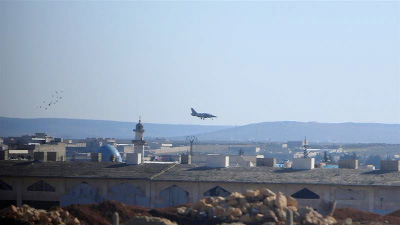
Reuters, Beirut :
Air strikes killed at least nine people in the Eastern Ghouta area near Damascus overnight and insurgent shelling from the rebel-held area landed near the Russian embassy on Tuesday, a war monitor reported.
The fighting strained a Russian-backed truce in the area. The Syrian military declared a cessation of hostilities there on Saturday.
Russia, a military ally of President Bashar al-Assad, said it had deployed military police in the Eastern Ghouta on Monday to try to enforce a de-escalation zone it said it had agreed with the Syrian opposition there.
The Syrian Observatory for Human Rights said the deaths in the air strikes in the Eastern Ghouta town of Arbin marked the first civilian casualties since the truce came into effect.
Further air strikes targeted the area on Tuesday morning, wounding four people, the Observatory said.
The shelling near the Russian embassy marked the first time rebels had hit government-held areas of central Damascus since the truce began.
The Observatory said the overnight air strikes wounded 30 people. The Civil Defence for rural Damascus, a rescue service operating in the area, said the dead included five children and two women.
In a statement on its Facebook page, it put the number of wounded and missing at 50. The air strikes hit the area at 11 p.m. (2000 GMT), it said.
There was no immediate comment from the Syrian military on the report, and no mention of air strikes by state media.
Witnesses said three mortar shells landed in the neighborhood where the Russian embassy is located in northeastern Damascus. There were no reports of casualties.
The Syrian army, with military support from Russia and Iran, has dealt the opposition a string of defeats around the capital over the last year, seizing back control of areas including Daraya and Moadamiya.
Meanwhile, Syrian rebels and activists are warning that an al-Qaida-linked jihadi group is on the verge of snuffing out what remains of the country’s uprising in northwestern Syria, after the extremists seized control of the opposition-held regional capital, Idlib, last weekend.
With the jihadis cementing their authority over the city and its province, also called Idlib, Syrian President Bashar Assad has been supplied with a useful pretext for a long-expected assault against the rebellious province: that the uprising against him is largely driven by Islamists and terrorists.

